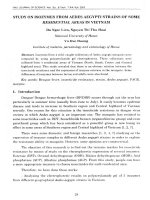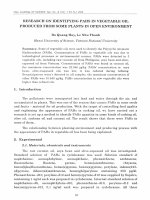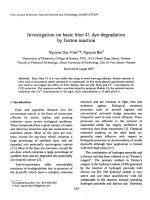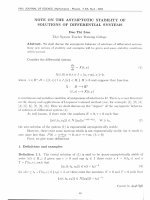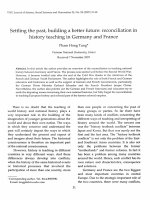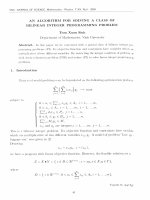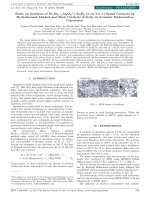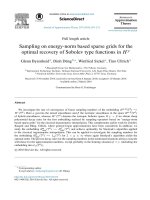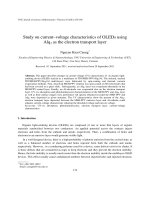DSpace at VNU: Perspectives on Teacher Professionalism: A Review of Literature
Bạn đang xem bản rút gọn của tài liệu. Xem và tải ngay bản đầy đủ của tài liệu tại đây (472.99 KB, 13 trang )
VNU Journal of Science: Foreign Studies, Vol. 32, No. 4 (2016) 39-51
Perspectives on Teacher Professionalism:
A Review of Literature
Duong Thu Mai*
Faculty of English Language Teacher Education, VNU University of Languages and International Studies,
Pham Van Dong, Cau Giay, Hanoi, Vietnam
Received 06 May 2016
Revised 28 November 2016; Accepted 29 November 2016
Abstract: Teachers, more than any other concerned people, often stand in the centre of the ever
on-going debates in advancing education quality. In recent decades, when the need for a
professionalization agenda of the teaching job has been made urgent in every education context,
teacher professionalism (TP) is among the most frequently mentioned dimension. It is impossible
to name any professionalization effort without describing what the corresponding teaching
professionals look like. In Vietnam, recent years have also witnessed a rapid increase of studies
and attention for teacher‟ knowledge and competence while the local literature on this issue is still
rather limited. By presenting the existing perspectives of TP along with practical examples before
discussing them in the light of major education goals, this article aims to provide a more
systematic conceptualization of this construct and its relatives, taking into account the well studied
theories and practices by world education researchers, to provide a reference source for concerned
policy makers, teacher education curriculum developers, teacher trainers, researchers, and student
researchers in education.
Keywords: Teacher professionalism, teacher competence, teacher education.
1. Definitions of key terms
number of dimensions, one of which is
professionalism.
In the past, one popular definition of
professionalism referred to the methods a
professional group of people use to enhance
their status and working conditions. When
applied for teachers, professionalism indicates
the methods they and other educational
authorities use to elevate the low status which
has been characterizing the teaching job for
many years. In contrast, most authors nowadays
operationalize it as the contents of
professionalization or “the knowledge and
competence equipped for teachers in order to
improve the quality, conduct, demeanour and
Professionalization indicates all the
measures to improve the status of the teaching
job and the teachers. This definition is agreed
by many authors, namely Ballantyne who says
it is the “drive towards creating teachers as
professionals” [1] or Zeichner [2], who argues
that professionalization is the most influential
agenda
to
affect
teacher
education.
Professionalization as such is realized in a
_______
Tel.: 84-1669686968
Email:
39
40
D.T. Mai / VNU Journal of Science: Foreign Studies, Vol. 32, No. 4 (2016) 39-51
standards” of teachers‟ job [3: 152]. More
simply, it implies everything teachers need to
know and be able to do. In this overview,
professionalism means the requirements of
teachers’ knowledge and/or competence and is
considered
a
versatile,
ever-changing
concept [4].
In recent decades, a professionalization
agenda of the teaching job has been made
urgent in mostly every education context,
resulting or corresponding to the popularity of
statements on TP. It is impossible to name any
professionalization effort without describing
what the corresponding teaching professionals
look like. In Vietnam, however, such
descriptions are still rare. In response, this
article will discuss professionalism from
outstanding research perspectives, with the
variety of opinions being obtained from key
researchers and theorists in the field of teacher
education before being thematically classified
and supported with examples from both quality
peer-reviewed
journals
and
authorized
governmental reports across countries.
2. Research perspectives of TP
The following sections classify TP
perspectives according to their major
requirements for teachers, and their time order
of prevalence.
2.1. Knowledge-based teacher professionalism
The classification of requirements for
teachers according to their knowledge(s) is
described herebelow under the umbrella term of
“knowledge-based approach” in teacher
professionalization. These are the most
traditional requirements for teachers.
The focus on subject matter knowledge
One crucial requisite for teachers is the
mastery of subject matter knowledge. Zeichner
[2: 4] referred to this trend in teacher education
as the “Academic Tradition”, which focuses on
“the importance of disciplinary knowledge for
pre-service teachers, gained through a classical
liberal arts education combined with an
apprenticeship
in
schools”.
However,
problematically, the emphasis on subjectknowledge is synonymous with teachers‟
inconfidence about their competence and
efficiency, their lack of coherence and
consistence with each other, and their limited
catering for students‟ needs. This is because
their professional knowledge is not comparable
to their subject matter knowledge base. An
example of the focus on subject knowledge was
provided by Shulman [5]. As described, 950
points of the total 1000 points in the 1875
California Teachers Examination deal with
subject matter and only 50 points were given
for the questions on Teaching knowledge and
skills. In other words, the weighing for
teaching/pedagogical knowledge is minimal.
This trend emerged in the US at the time
teacher professionalization was toward mass
public education and the educational goal was
mainly socialization of education.
The focus on teaching skills
Resulting from the increasing significance
of accountability in the professionalization
agenda, clearer national and local requirements
for teachers in what they do in the class have
been established, especially regarding their
ability to make judgments. As opposed to the
first trend, most academic literature in teacher
education in the world more recently reflects
the higher emphasis on teaching skills,
compared to and separated from that on
subject knowledge. The justifications are new
responsibilities and roles for teachers,
indicating the functioning of new skills which
should be cognitive-based rather than
behavioristic, and calling for new dispositions
for good teaching.
When the focus moves to teaching skills,
research skills and teacher commitment are
popular requirements. Teachers also need to
collaborate even more in order to fulfill various
new responsibilities for the students, and to
individualize their teaching for different
D.T. Mai / VNU Journal of Science: Foreign Studies, Vol. 32, No. 4 (2016) 39-51
students. Therefore, processes, problem-solving
and field practices plus reflection are made
important contents in teacher standards and
teacher preparation, in the hope that they would
solve the inequality and injustice in education
[6]. The problem with the pedagogy-based
orientation is these contents may be too specific
and unconnected [7]. More seriously, the
acquired competences are often quantified,
differentiated and then qualified without little
consideration for teacher learning capacity.
Many examples can be taken to illustrate
this trend. The success of Finnish students in
PISA (Programme for International Student
Assessment) and international examinations, for
one example, has been attached with the strong
pedagogical competencies of teachers [8].
Besides professional knowledge (subject matter
knowledge), English teacher standards pay
higher attention to professional attributes (such
as developing relationships, communicating,
understanding
legal
documents)
and
professional skills (establishing expectations,
positive attitudes to learning, keeping
disciplines, etc). For another example, the
following instrumental skills for teachers were
listed in the US in the 1980s [5]:
- Organizing the preparation and
presentation of lesson plans
- Evaluating
- Recognizing students‟ differences
- Being aware of cultures
- Understanding the youth
- Managing
- Understanding educational policies and
processes
Other practical examples of pedagogical
knowledge emphasis can be taken from Indian,
English and Australian teacher education [9].
Hardly anyone would say that subject matter
knowledge is sufficient for teachers. It is even
mis-taken for granted as a common knowledge
every teacher must have.
When the emphasis on these pedagogical
knowledge and skills is extreme; teachers are
no longer prerequisitely trained about the
41
subject they teach. Moreover, surprisingly, not
many of the well reported frameworks of
teacher knowledge give sufficient care for both
classroom management skills and knowledge
management skills [10]. Meanwhile, one
remarkable feature of many teacher pedagogy
knowledge frameworks is that they are still
expressed
in
task-analysis
behavioral
statements such as “allocate time and turns”,
“praise and blame”, “ask questions”, etc. [5: 9].
The failure to capture contextual difficulties,
the inadequate attention to teachers‟ emotion,
the ignored or overemphasized role of reflection
are among the key critiques. Despite the
drawbacks, thanks to the effects of these
requirements in improving pedagogical skills,
teachers are more concerned as professionals
than ever before.
A more balanced knowledge-based teacher
education
Against the bias in favour of either subject
knowledge or pedagogical skills, some
researchers provide more balanced frameworks.
Evertson [11] mention in their meta-analysis of
teacher education research a trend that teachers
should be required to deepen their knowledge in
both the subject area, liberal arts and the
knowledge/capacity
about
teaching.
Furthermore, Shulman [5] [10] suggests
teachers should not only be trained in either
discipline knowledge or pedagogy. Teacher
education, on the other hand, must logically
connect pedagogy to the specific subject
knowledge, and provide the teacher candidates
with courses in using their:
- content knowledge: the body (facts,
concepts, explanations, emphases, etc.) and
organization of knowledge (such as via
Bloom‟s taxonomy, Gagné‟s varieties of
learning)
- pedagogical content knowledge:
including general pedagogical knowledge (the
subject matter knowledge for teaching such as
idea representations, analogies, examples,
illustrations,
models,
frameworks,
demonstrations, knowledge on student learning
42
D.T. Mai / VNU Journal of Science: Foreign Studies, Vol. 32, No. 4 (2016) 39-51
and errors, etc.) and pedagogical content
knowledge (teachers‟ personal form of
professional knowledge which blends content
and pedagogy into ready instructions of each
unit or lesson)
- curricular knowledge: the knowledge
about programmes to apply the content
knowledge and pedagogical knowledge
(instructions, programme features, contexts,
instruction-assessment process, alternative
methods for instruction, etc.).
- other educational knowledge such as
knowledge of learners, education contexts,
education goals, perspectives, values and their
history.
Although Shulman‟s framework for teacher
knowledge is well known for its completeness,
it still receives criticisms. It is claimed to base
on rather theoretical knowledges. Teacher‟s
personal development and knowledge of
educational outcomes are also not included in
the list. The framework also seems to pioneer in
the quantification and limitation of TP, an
approach which may give rise to the omission
of the other rich elements of the teaching job
(contexts, ethics, emotions, etc.) [12]. This
approach
of
listing
the
instrumental
requirements for teachers, however, has since
then been echoed by many authors, such as
Feiman-Nemser [13], and continues until the
year 2000 in the U.S., with the support of the
government for certain key elements in teacher
education [12]. Teachers in England, Australia
and New Zealand are also encouraged to follow
similar restricted version of professionalism.
The requirement for meta-knowledge in teacher
education
Resulting from a prominent teaching
philosophy dated for decades named
individualism, individual teachers are believed
to be sufficiently competent in teaching with
their subject knowledge. The autonomously
prepared teachers make their own decisions
about how to implement curriculum innovations
and about which teaching methods to choose by
themselves
in their classrooms.
The
development of professional knowledge is often
conducted via workshops by offsite experts on
unrelated topics to the classrooms of the trained
teachers. This requirement, or autonomous
professionalism, is apparent in many teacher
education systems. In England, besides other
countries, professional autonomy is one of the
four aspects usually associated with
professionalism (besides strong knowledge
base, commitment to the job, strong individual
and collective identities). Also, teacher
professional autonomy has been reported as a
major trend of TP in OECD (Organization of
Economic Cooperation and Development)
countries in the early period [14].
Mean while, the overwhelming increase in
the required subject knowledge amount, the
wide variety of pedagogical approaches
available for their choice and the involvement
of many other stakeholders in education have
led this autonomous teaching philosophy to
change dramatically. Occupational heteronomy
characterizes the teaching profession, rather
than the traditional autonomy [12]. On
discussing the variety of new teaching
approaches
and
social
responsibilities,
Hargreaves [3] contrasts the old, autonomous,
individualistic, and restricted TP with new,
collective,
collegial
and
extended
professionalism. Teacher autonomy is no
longer suitable to teachers who have to teach
things they have not been trained, so teachers
should be required to collaborate.
A good example for teacher collaborative
professionalism can be taken from Irish teacher
education, where teachers are expected to adopt
a more interactive relationship with students,
teachers, parents and other stakeholders. In the
classroom subject teachers often work
alongside special assistants and learning
support teachers. Outside of the classroom,
teachers also liaise with a range of other staff
about school development, school evaluations
and special education needs of students, among
other areas [15]. Another appropriate
illustration is the case of Finland, where the
modern TP can be described in terms of
D.T. Mai / VNU Journal of Science: Foreign Studies, Vol. 32, No. 4 (2016) 39-51
individuals who: (i) appreciate the role of active
personal learning as a professional tool; (ii)
cooperate, interact and communicate well; (iii)
see themselves as both individuals and society
member, and (iv) devote to their work [16].
2.2. Competence-based Teacher Professionalism
Competence is a newer concept than
knowledge in education. According to Zeichner
[2], the 1960s-1970s marks the impressive
appearance and development of competencebased/performance-based teacher education in
the US. All the previous versions of
professional rules do not seem to solve the
problems that the complex contexts of teaching
are creating. Various versions of competencies
have been defined. Authors base on different
values and political perspectives/dimensions to
create them. There is a lack of a shared view of
occupational competence and a reliable
knowledge of teacher learning to construct
programmes. In other words, agreement in the
most
important
contents
for
teacher
competences
simply
does
not
exist.
Contemporary competence-based TP is a
typical case of multidimensionality, as reflected
below through different lenses.
2.2.1. The components of competence
The components of competence are taken as
the first lens to look at different definitions of
competence-based TP. Most contemporary
literature reveals that teacher competence
models should integrate the knowledge, skills,
and disposition teachers should apply in their
job; competence is the general umbrella term
for a major task of the job, while competencies
are often conceptualized as the more specific
responsibilities.
If knowledge (such as subject matter
knowledge or knowledge of students) and skills
(such as pedagogical skills) are familiar in
knowledge-based TP, the emphasis on teacher
dispositions or attitudes into this concept is a
specialty of the competence-based era. In
eastern countries such as Japan, Korea and
China, teachers were required to have certain
43
personalities in order to deal with the changes
in modern students‟ mental features; in
Malaysia, the teachers must be dedicated to the
national identity. Teachers are believed to be
active in the realization of the ideal society and
the transformation of the society, with
everything they possess (knowledge, skills,
values, etc.). Despite all that, inadequate
attention has been paid to the integration of this
content into teacher education.
To explain for the focus on disposition, a
number of reasons have been named.
Hargreaves [3] considers that teaching is an
emotional profession in which commitment,
care, self-direction, etc. are named as important
attitudes. Consequently, teachers always have
to face worries, fear, loneliness, uncertainties
and other negative feelings in their relationships
at school and in conducting their tasks. This is
not to mention the need to cope with complex
and diversified school environments.
Many traits have been mentioned as
important in teacher disposition. One of the
most complete discussions of teacher
dispositions is given by Sockett [17], who
claims that this highly complicated concept can
be interpreted from numerous perspectives.
Stable as they are, they cannot be equalized to
“personality traits” because they are conscious,
cognitive, learnt and intentional actions. People
often reflect and judge themselves based on the
intentionality of those acts. A specific behavior
will not lead to the same assumption of
dispositions in different contexts. Therefore, it
is impossible to explain actions based on
dispositions, but it is possible to predict the
tendency of actions. When dispositions become
virtues, i.e., when they are initiated by a person,
realized with intrinsic motivation after severe
self-opposition, the construct of dispositions
can be framed for assessment in teacher
education. Sockett has also identified three
relating domains of dispositions needed for
teaching: character, intellect, and care, with the
suggested components as below. The variation
of dispositions in different times may result
from changing educational goals.
44
D.T. Mai / VNU Journal of Science: Foreign Studies, Vol. 32, No. 4 (2016) 39-51
Table 1. Dispositions of teachers
Character
Self-knowledge
Courage
Sincerity
Integrity
Trustworthiness
Endeavour (persistence,
perseverance, heed)
Intellect
Trustfulness
Accuracy
Consistency
Fairness and impartiality
Clarity
Thoughtfulness
Open-mindedness
The best example of the disposition trend in
Asia can be seen in Singaporean value-based
education and teacher education. Teachers of
the 21st century are required to be competent in
disposition-based life skills such as flexibility
and adaptability, initiative and self-direction,
teamwork and collaboration, social and crosscultural skills, productivity and accountability,
leadership and responsibility. Leadership and
management and personal effectiveness, which
are highly related to teachers‟ spiritual traits,
are even named as two of the three dimensions
in teacher competencies, besides professional
practice (National Institute of Education,
Teacher education of the 21st century). Shi [18]
states that in China, one of the cores of teacher
education according to the revised educational
laws is possessing good personality, moral
values and commitment to work in education.
When it comes to discussing teachers‟
dispositions, many teacher education curricula
in the east introduce courses in the citizenships
of the country (such as Malaysia‟s Islamic
civilization, China‟ politics) in an effort to
reduce the local polarization of values and
improve the national spirit among the teachers
who are responsible for preparing the nations‟
new
generations
(Australia,
Malaysia,
Philippines, China, etc.)
2.2.2. Political perspectives in defining
teacher competences/professionalism
Previous sections focus on research
perspectives of TP, while this section highlights
the reconceptualization of this term under
practical conditions.
Care
Tolerance
Tact
Discretion
Civility
Receptivity
Relatedness
Responsiveness
Definitions
In practical definitions of TP, among the
competing professionalism conceptions, the
most noticeable difference is in terms of
political management perspectives [4], between
the
democratic
and
social-contextual
professionalism against the commercialized
(also called the efficiency-based) one. Behind
both of these competing approaches, teacher
education is believed to be a political issue
[19], or the right policy is assumed to create
good quality in teacher education. Based on
different education goals, the democratic
professionalism emphasizes that social justice
and equality should be the main aims: education
should benefit everyone. The commercialized
professionalism, which is often designed by a
small number of members in the teacher
education field on behalf of many groups of
stakeholders, emphasizes standards, output
controls, market type mechanism, competition,
etc. Other features of the commercialized
version include the focus on research and
evidence.
Social contextual professionalism
This trend is named the Developmental
Tradition in teacher education by Zeichner [2].
Besides the traditional requirements as above
listed, in this democracy-focused era, teachers
are required to have a knowledge of social
justice, the skills to create social justice in the
classroom and to train students on it, and the
dispositions related to social justice, such as
treating students fairly, caring for the
underprivileged ones, etc…For example,
D.T. Mai / VNU Journal of Science: Foreign Studies, Vol. 32, No. 4 (2016) 39-51
teachers should be able to teach students about
global problems and interactions. Moreover, the
students in the modern world face a fast
changing society, and teachers should have the
knowledge, skills and attitudes to teach them to
adapt [20]. Otherwise, teachers themselves
should be globally competent, dealing with
students of all types, races, religions, etc. Never
has learner-centeredness been so popular as an
approach in education, in which students‟
individuality and personal role are highly
respected [18].
Some examples can be taken. In China,
teachers are required to give up the traditional
teacher-centered approach and replace it with
the utmost care for learners‟ needs [18]. The
National Council for Teachers of Mathematics
in the United States, for another example, has
organized their standards and principles for
effective teachers in several groups, the first of
which is Equity. More critically than being
knowledge transferors, teachers are considered
agents of social transformation [12].
After the 2000s, teacher effectiveness must
be understood not only as outcome-related but
also in the influences of social contexts and
relationships, resulting in holistic version of TP.
Grant [21] mentions the following skills of
effective teachers:
- Pedagogical
skills:
implementing
teaching strategies based on all
knowledge resources
- Reflection
skills:
analyzing,
researching,
acting on
teachergenerated data based on goals, values,
assumptions.
- Communication and collaboration skills
- Management skills to create learning
environments
- The ability to use technology as a
teaching-learning tool (to communicate,
to plan, to improve lessons, etc.
Similar ideas were put forward by Collins
[9] and in Australia where effective teacher
preparation should include but do not limit to: a
variety of meaningful concepts and related
45
theories, and a variety of principles to examine,
justify and change practices (such as ethics,
research, culture, theories of human (children
and adult) development, insights into diversity
and inclusivity, experience in learning sites, and
human learning practices and debates about
them).
It‟s hard to neglect the issue of integrating
modern technology in teacher education. The
boom of modern technology has impacted the
training of teachers in almost every country,
making mastery of technology a required
competence in teacher professionality. To teach
effectively, to access the resource of
knowledge, and to produce good outcomes in
education, i.e. students who have IT skills,
teachers must be trained on and be competent in
information literacy.
This trend has been reflected thoroughly in
China and Singapore where the use of ICT is
one of the major core courses in educational
studies. In European countries such as Austria,
France, in the US and Canada, ICT has become
a compulsory subject for student teachers since
the early 1990s. In England, ICT is not only a
subject, but is practically embedded in the
instruction of all subjects at teacher education
schools and for professional development
programmes to gain the maximum effect.
Teachers are not qualified in England and
France if they do not meet a set of ICT
standards for pre-service teacher education
courses.
As it is stated, the world has turned into an
information age; teacher education cannot stay
in the industrial age.
Commercialized professionalism
In this perspective, a (usually short) list of
pre-specified
and
standardized
teacher
competencies is formed. Teachers are to
respond to the needs of individual students, and
to be more flexible on the choice of knowledge
to equip themselves and to apply to students.
Great attempts have been made to cut down on
theoretical subjects and courses teachers need to
learn at teacher education schools, lower
46
D.T. Mai / VNU Journal of Science: Foreign Studies, Vol. 32, No. 4 (2016) 39-51
qualification is required from them, and more
flexible input criteria are set for the teacher
candidates/new teachers. This tradition is
similar to the so named “social efficiency” one
by Zeichner [2].
School-based teacher education is a key
commercialized trend in teacher education,
involving the recruitment of subject knowledge
masters by schools due to the shortage of
officially qualified teachers. Like in the preprofessionalization stage, subject matter
knowledge is given priority over pedagogical
knowledge and dispositions. Teachers are those
with strong subject knowledge and just need to
be trained at schools in the latter two contents.
However, little training is provided on these
alternative courses [22]. As an illustration,
England is the country with the strongest wave
of school-based teacher education in recent
years (32 alternative routes) [22]. The 2002
Education Act of England has claimed one key
policy that schools are allowed to use and train
adults without certification for certain teaching
tasks. These “paraprofessional” teachers can
work as teaching assistants, teacher trainees or
even advanced skill teachers. In the US, some
examples of alternative teacher preparation
programmes are Teach for America (one of the
few clearly successful alternative programmes
of teacher education) and alternative-route
teacher education programmes [22, 23]. In
California, for another example, teachers do not
need to complete a teacher education
programme or to be licensed before starting to
work at schools [23]. Many teacher candidates
have already worked as full-time teachers, with
about 200 hours of formal instruction by
mentoring teachers. In Finland, some schools
have been able to enjoy the decentralized
administration and take responsibility for
training their own teachers. Other countries
with alternative teacher education (sometimes
named fast-tract programmes) include Chile,
Denmark, Sweden, the Netherlands, Belgium,
Switzerland, the Philippines, etc.
While this alternative route to train teacher
professionals appear to bring new winds to the
situation of teacher shortage, and bring focus
back to the used-to-be respected teacher
autonomy and subject matter knowledge
training for teachers [23], there is a question
mark over the quality of teacher training in
these programmes, the preparation contents for
teacher candidates, and the kind of guidance
they receive. In order that the problems of
alternative programmes can be avoided and that
teacher professionalization is not undermined,
collegial,
the
university-based
teacher
preparation which equips a teacher with many
skills that schools cannot should still be
the norm.
As a concluding note for this section, based
on the political perspective, TP in the current
days can be defined with an essentialist view,
containing a short list of requirements for
teachers or can be defined in a broad sense
which enables it to reflect the most valued
teacher education ideas in different period of
times and the contexts of those ideas. Most
definitions of professionalism in the
postmodern
time
have
avoided
the
overemphasis on either extreme of democracy
and commercialization. The reliance on either
extreme is considered ineffective as it neglects
the advantages of the other.
3. Summary and discussion
This paper has attempted to look at TP from
different perspectives. In the professionalization
of the teaching job, the concepts of
professionalization have evolved in quite a
systematic journey. The different concepts of
professionalism can be summarized in the
following table:
D.T. Mai / VNU Journal of Science: Foreign Studies, Vol. 32, No. 4 (2016) 39-51
47
Table 2. Perspectives on Teacher Professionalism
Research perspectives of TP
Knowledge-based TP: requirements for a master in
subject matters, teaching skills, or a balance of them,
meta-cognitive knowledge (individual or collegial
professionalism)
Competence-based TP: requirements for the
integration of knowledge, skills, and dispositions
To explain for this diversity, apparently
underlying the variation from one perspective to
another as above are different teaching-learning
philosophies and educational goals/outcomes.
For one thing, research perspectives on the
requirements for teachers can be based on many
dimensions, such as student learning, teacher
learning, or society reconstruction [2]. Many
different teaching methods are available with
the same purpose of improving student
learning. As regards the roles for teachers and
students, either of them can be the centre of the
classroom. In the teacher-centred class
prominent since the 1970s, knowledge was
typically presented to the learner in a role of “a
blank page” instead of a discovery-emphasized
approach and the basic teaching methods were
recitation or lecturing, along with other
monotonous sequence of note-taking, questionand-answer. Such approach is still challenging
the more newly developed and well-supported
student-centred teaching approach, which focus
on students‟ differences in needs, learning
styles, backgrounds, etc. Besides, teaching
methods can also vary in the content focus,
from learning process to learning products. In
the meantime, in terms of teacher learning, it is
believed that one could learn to become a
teacher through practical apprenticeship, and
one improved as a teacher by individual trialand-errors. This echos a popular teacher
development perspective, i.e individualism, in
which individual teachers are believed to be
sufficiently competent in teaching. As opposed
to that is the philosophy of collegialism, which
suggests that teachers learn by collaborating,
mostly on pedagogical topics due to the
Political perspectives of TP (practical
reconceptualization of the research perspectives)
Social contextual TP: requirements for being an agent
of social transformation (with competencies in ICT,
communication skills, living skills, etc)
Commercialized TP: a shortened list of requirements
availability of multiple teaching methods to
them. Finally, with regards to society
reconstruction, at schools, certain instrumental
subjects have been selected, for example,
mathematics and science are emphasized for
social efficiency and economic effectiveness;
teaching quality is considered to be a more and
more significant factor for successful student
learning, and teacher education is believed to
play an important role in shaping quality
teaching [20]. These are several dynamics in
the teaching and learning theories which lead to
the changes in the requirements for teachers.
Facing so many versions or perspectives on
TP, a more salient issue of interest for new
researchers and teacher trainers is to decide
which one is better than the other. This is a hard
question to answer without investigating further
into the functions and goals of teacher
education. The better perspective should
address the agreed functions and goals of
education. According to Labaree [24], the social
purposes to be embedded in all curricula
include democratic equality (everyone is equal),
social efficiency (education should efficiently
serve the needs of the society and prepare the
workforce for it), and social mobility (education
should help a person to improve or maintain a
good social status), which are mutually
influential.
Judging from this classification, the goal of
democracy in teacher education appeared to be
dominant in the 1960s and 1970s before social
efficiency takes the priority. Effective teachers
have been defined as having either strong
subject knowledge mastery (in the earlier
48
D.T. Mai / VNU Journal of Science: Foreign Studies, Vol. 32, No. 4 (2016) 39-51
decades) or strong pedagogical knowledge
mastery (in the later decades) but the increase in
the types and complexity of knowledge for
students has forced them to change from
individualism to collectivism. The impact of
social mobility is gradually escalated,
illustrated by the extreme significance of
accountability issues, the increasing value for
education results rather than the qualities it
creates (known as credentialism), and the
adoption of standards of teacher competences in
many countries. It is apparent that the political
goals of education are considered more
important than or at least as important as other
similarly essential educational goals such as
students‟ learning and meeting students‟
interests. This idea has been reflected by
Cochran-Smith [25] by claiming that teacher
education nowadays is a political sphere.
Despite being one important educational goal,
democratic values such as equality and diversity
are not as emphasized in the period of 1980s2000 as the other two goals, especially in
Western countries.
Besides socialization, education has other
goals which are not discussed by Labaree.
Biesta‟s classification [26] of education
functions also state qualification and
subjectification (making learner self-sufficient
and independent from external imposition to
perform the work), in which education does not
only serve the society but also the individuals.
The three functions of qualification,
socialization and subjectification are interrelated and inter-influential. As regards this
classification, TP in the period from 1960s to
2000 has reflected the movement of dominant
education functions from qualification to
socialization. In the earlier stage, teachers were
trained so that they can function in their
profession and later to match the social
requirements on the job. The goal of
subjectification (making teachers more
confident in teaching, such as focusing on their
disposition) has also started to be appreciated in
the later decades. However, this goal has not
been paid equal attention to other goals.
In order to avoid goal bias, it is highly
important for curriculum designers to
reconsider not only the question of teacher
effectiveness and the goal of socialization but
also all available resources of content
knowledge, education materials and principles
(such as human understanding and learning
processes, educational goals, curricula, school
structures, culture, etc.), contexts and teaching
practices [10]. In terms of educational goals,
socialization and social efficiency/mobility are
undoubtedly key goals, but democracy,
qualification, subjectification and students’
learning should also be in focus.
In fact, many teacher education and teacher
professional development programmes are
being improved in the consideration of a more
balanced goal system. Positively, this effort is
named “reprofessionalization” in which
important
values
in
the
previous
professionalization era are altered and
improved. Specifically, the contents of training
are again regarded to be important besides the
form or structure of teacher education
programmes. Although programmes contrast
heavily on the contents they offer, based on
more comprehensive definitions of education
outcomes and competences, the range of
contents becomes more balanced and holistic
than in the previous stages of teacher education,
demanding a higher flexibility and vision of
teacher educationers. Prepared teachers need to
be masters in subject matter, how students
learn, how to represent knowledge, solve
problems, test new teaching methods, reflect,
and possess a range of dispositions as virtues.
No longer can subject matter knowledge or
pedagogical knowledge take the utmost
position.
Research-over-oriented
teacher
training programmes are no longer highly
encouraged. Instead, other values are recovered
or emerge such as the role of student learning
outcomes, contexts, global development and
field work in teacher education, besides others.
From such development, it can be concluded
that the role of teacher education in the postmodern world, in general, is not only to create
D.T. Mai / VNU Journal of Science: Foreign Studies, Vol. 32, No. 4 (2016) 39-51
qualified teachers who have a good
understanding of the norms and values in their
job. In all programmes, including alternative
routes, more attention has obviously been paid
to the personal development of teachers in
addition to the formal instruction in subject
matter knowledge, pedagogy, attitudes. Such
comprehensive professionalism is also inherent
in the strong education systems such as Finland,
Sweden. Optimistically, a highly important,
though not really clearly articulated, goal of
these programmes is to create teachers as wellrounded autonomous (qualified and socialized)
practitioners – a more superb autonomy than in
the pre-professionalization stage.
The conflicts between old and new
professionalisms may be the most challenging
obstacle for teacher education designers, but if
conflicts are regarded as essential catalysts for
the growth of profession and that a profession is
only a profession when generalization of ideas
in it is barely possible [4], the varied
perspectives in the modern teacher education
could be a good sign of improved teacher
professionalization. Moreover, because social
contexts always change, relying on contexts to
define professionalism is not a sound choice
[20]. It is always more persuasive to look back
at teacher education and judge it from the goals
it is serving.
With regard to localized TP in Vietnam, the
scope of this paper does not allow for in-depth
discussion, but some overall features can be
conspicuous. First, there are signals that teacher
education curricula still pay more attention to
particular teacher education components than
others. Subject knowledge, for instance, are
more valued compared to pedagogical,
pedagogical content knowledge and teacher
dispositions. The major approach revealed in
the outcome statements and curricula of most
teacher training universities is also still largely
knowledge-based, despite the recently widely
discussed competence-based approach. Even in
the knowledge-based approach, teachers‟ metaknowledge to work with each other and
colleagues are not yet adequately considered.
49
Thus, the teaching job in Vietnam has many
features of the pre-professionalization period.
Regarding the prominent teacher education
goals, the system tends to focus more on
qualification and socialization than on
subjectification. Basically, this means teacher
education mainly targets at equipping teachers
with the skills, knowledge, attitudes, values,
standards, etc. to do their job, and to develop
the society rather than at how to make teachers
competent enough to be independent from the
norms, to decide or create their own way of
doing their job. The professionalization of the
job, with the features as described does not
seem to affect Vietnam to a significant degree.
A future and better invested analysis is highly
needed to describe the complex situation of TP
in Vietnam and make more detailed
recommendations. Within the scope of this
paper, the most obvious issues revealed about
the TP and teacher education curricula in
Vietnam that needs further investigation for
improvement may include at first a redefinition
of TP in the light of the targeted teacher
education
goals
and
objectives,
the
professionalization trends in the world, the
knowledge- or competence-based frameworks,
the issue of teachers „ disposition, etc.
Moreover, a redefinition of teacher education
curricula with new courses or renewed old
courses in which research, practicum, reflection
and other highlighted practicum strategies
should be considered in deeper focus. Further
investigations in these areas are highly needed.
References
[1] Ballantyne, J. (2003).Current trends in teacher
education: Some implications. In: Proceedings of
NZARE - AARE Joint Conference 2003.
Auckland, New Zealand, (1-11). 29 November - 3
December 2003.
[2] Zeichner, K.M & Liston, D.P. (1990).
Restructuring teacher education. Journal of
teacher education. 41 (2), 3-20
[3] Hargreaves, A. (2000). Four ages of
professionalism and professional learning.
50
[4]
[5]
[6]
[7]
[8]
[9]
[10]
[11]
[12]
[13]
[14]
[15]
D.T. Mai / VNU Journal of Science: Foreign Studies, Vol. 32, No. 4 (2016) 39-51
Teacher and Teaching: History and Practice, 6(2),
151-182.
Whitty, G. (2006). TP in new times. Journal of
In-service education, 26 (2). 281-295
Shulman, L. S. (1986). Those who understand:
Knowledge growth in teaching. Educational
Researcher, 15(2), 4-14.
Zeichner, K. M. (2003). The adequacies and
inadequacies of three current strategies to recruit,
prepare, and retain the best teachers for all
students. Teachers College Record, 105(3), 30.
Reynolds, M. & Salter, M. (1995). Models of
competence and teacher training. Cambridge
Journal of Education. 25 (3). 349-359.
Malm (2009). Toward a new professionalism:
enhancing personal and professional development
in teacher education, Journal of Education for
Teaching, 35(1), pp. 77-91.
Collins, C. (2004). Envisaging a new education
studies major: What are the core educational
knowledges to be addressed in pre-service teacher
education. Asia-Pacific Journal of Teacher
Education, 32(3), 228-240.
Shulman, L. S. (1987). Knowledge and teaching:
Foundations of the new reform. Havard
Educational Review, 57(1), 1-22.
Evertson, C.M, Hawley, W.D & Zlotnik, M.
(1985). Making a difference in educational quality
through teacher education. Journal of Teacher
Education. 36 (3). 2-12
Mockler, N (2005). Trans/forming teachers: New
professional learning and transformative TP.
Journal of In-Service Education, 31(4), 733-746
Feiman-Nemser, S. (2001). From preparation to
practice: Designing a continuum to strengthen and
sustain teaching. Teachers College Record,
103(6), 1013-1055.
Musset, P. (2010a). Initial teacher education and
continuing practices in OECD countries and a
literature review on potential efects. OECD
Education
Working
Papers,
48.
doi:
10.1787/5kmbphh7s47h-en
Conway et al. (2009). Learning to teach and its
implication for the continuum of teacher
[16]
[17]
[18]
[19]
[20]
[21]
[22]
[23]
[24]
[25]
[26]
education. Report Commissioned by the Teaching
Council of Ireland.
Bergem, T, Björkqvist. O, Hansén, S.E,
Carlgren, Ic & Hauge, T.E (1997). Research on
Teachers and Teacher Education in Scandinavia: a
retrospective review. Scandanavian Journal on
Educational Research. 41 (3-4). 433-458
Sockett, H. (Ed.). (2006). Teacher Dispositions:
Building a Teacher Education Framework of
Moral Standards. Washington, DC: American
Association of Colleges of Teacher Education.
Shi, X., & Englert, P. A. J. (2008). Reform of
teacher education in China. Journal of Education
for
Teaching,
34(4),
347-359.
doi:
10.1080/02607470802401537
Cochran-Smith, M. (2005). The new teacher
education: For better or for Worse. Education
Researcher, 34(7), 3-17.
Wang, J., Odell, S. J., Klecka, C. L., Spalding, E.,
& Lin, E. (2010). Understanding teacher
education reform. Journal of Teacher Education,
61(5), 395-394-392.
Grant, C. A., & Gillette, M. (2006). A candid talk
to teacher educators about effectively preparing
teachers who can teach everyone's children.
Jounal of Teacher Education, 57(3), 292-299.
Musset, P. (2010b). Initial teacher education and
continuing training policies in a comparative
perspective: Current practices in OECD countries
and a literature review on potential effects OECD
Education Working Papers (Vol. 48): OECD
Publishing.
Zeichner, K. (2003). Teacher research as
professional development for p-12 educators in
the U.S. Educational Action Research, 11(2), 301325.
Laberee, D. F. (1996). The trouble with Ed
schools. Educational Foundations, 10(3), 27-45.
Cochran-Smith, M. (Ed.) .(2002). “Evidence and
Inquiry in Teacher Education.” Special issue of
Journal of Teacher Education 53(2)
Biesta, G. (2010). 1. What is education for? Good
education in an age of measurement: ethics,
politics, democracy (pp. 11–27). Boulder, C:
Paradigm Publishers.
D.T. Mai / VNU Journal of Science: Foreign Studies, Vol. 32, No. 4 (2016) 39-51
51
Các quan điểm về năng lực chuyên môn dành cho giáo viên
Dương Thu Mai
Khoa Sư phạm tiếng Anh, Trường Đại học Ngoại ngữ, ĐHQGHN,
Phạm Văn Đồng, Cầu Giấy, Hà Nội, Việt Nam
Tóm tắt: Từ trước tới nay, năng lực chuyên môn của giáo viên luôn là tâm điểm của các cuộc thảo
luận nhằm nâng cao chất lượng giáo dục. Trong những năm gần đây, khi việc chuyên nghiệp hóa nghề
giáo viên đã trở nên quan trọng hơn, năng lực chuyên môn của giáo viên cũng trở thành một trong
những cụm từ liên quan được nhắc tới nhiều nhất. Rất khó có thể mô tả những cố gắng chuyên nghiệp
hóa nghề giáo viên mà không nói tới khái niệm người giáo viên cần có năng lực, kiến thức chuyên
môn như thế nào. Ở Việt Nam, chủ đề kiến thức và năng lực của giáo viên cũng đang thu hút sự chú ý
của các nhà quản lý giáo dục và nhà nghiên cứu, nhưng cơ sở lý luận để tham khảo về chủ đề này vẫn
còn rất hạn chế. Bài báo này sẽ trình bày những quan điểm nổi bật về khả năng chuyên môn của giáo
viên cùng các ví dụ của các quan điểm này trên thực tế cũng như trong lý luận nghiên cứu trước khi
bàn luận về các quan điểm này theo các mục tiêu giáo dục quan trọng, với mục đích cung cấp một
tổng quan có hệ thống về khái niệm này. Bài báo có thể là nguồn tham khảo hữu ích cho việc hoạch
định chính sách giáo dục, phát triển chương trình đào tạo sư phạm, đào tạo giáo viên, và nghiên cứu
giáo dục.
Từ khóa: Khả năng chuyên môn của giáo viên, năng lực của giáo viên, đào tạo sư phạm.
